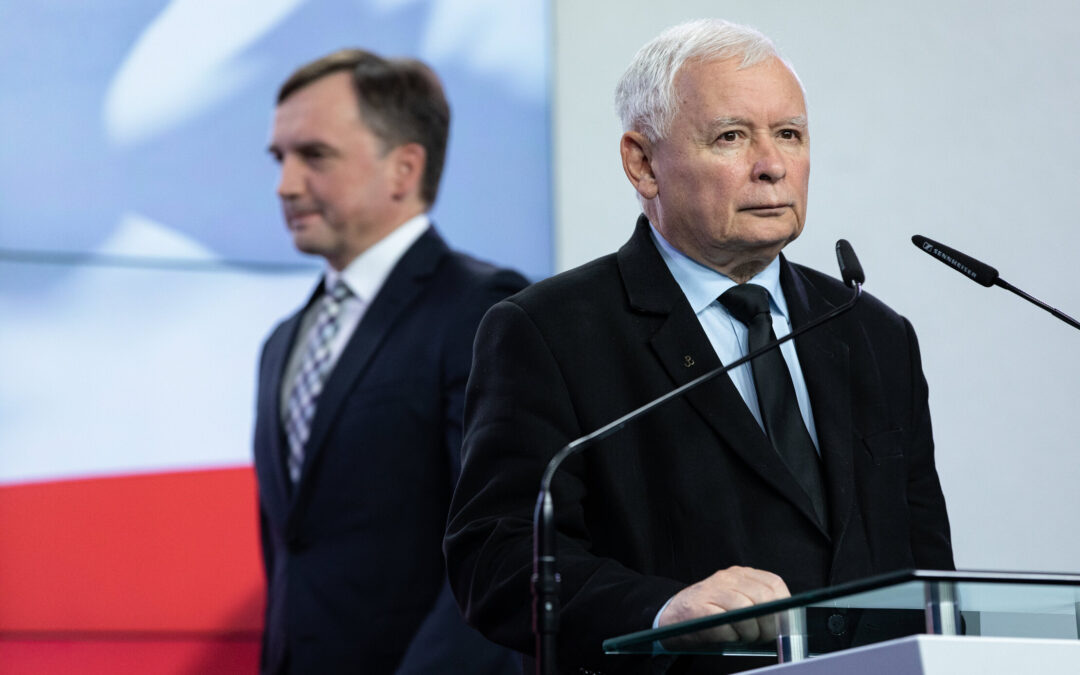The national-conservative Law and Justice (PiS), Poland’s main opposition party, has confirmed that it will merge with the smaller hard-right Sovereign Poland (Suwerenna Polska), with which it has already been allied for the last decade.
Last month, PiS leader Jarosław Kaczyński revealed that “advanced talks” were underway regarding a merger of the two parties and in recent days unnamed PiS politicians told the Polish Press Agency (PAP) that an agreement had been finalised.
On Tuesday, Mariusz Błaszczak, who is a deputy leader of PiS and head of its parliamentary caucus, confirmed in an interview with broadcaster wPolsce24 that the merger was going ahead and would take place this Saturday, 12 October.
“Everything has been agreed upon,” said Błaszczak. “This is what Law and Justice voters expected. They expected unity.”
TYLKO U NAS. @mblaszczak potwierdza: Wszystko jest domówione. Do połączenia obu partii @pisorgpl @Suwerenna_POL dojdzie w najbliższą sobotę https://t.co/f6eqY8twaV
— wPolityce.pl (@wPolityce_pl) October 8, 2024
Sovereign Poland (which was called Solidarna Polska, or United Poland, until 2023) was formed in 2012 by a group of politicians who broke away from PiS. The party has since then been led by one of those rebels, Zbigniew Ziobro.
Since 2014, its candidates have stood on PiS’s electoral lists. In practice, this means that, in parliament, Sovereign Poland’s MPs are part of the PiS caucus, though they retain a somewhat separate identity and take different positions from PiS on certain issues.
Currently, there are a total of 190 MPs in the PiS caucus in the 460-seat Sejm, the more powerful lower house of parliament. Most of them, 167, come from PiS itself, while 16 belong to Sovereign Poland (with seven others belonging to neither party).
Sorry to interrupt your reading. The article continues below.

Notes from Poland is run by a small editorial team and published by an independent, non-profit foundation that is funded through donations from our readers. We cannot do what we do without your support.
Between 2015 and 2023, Sovereign Poland was also part of the PiS-led United Right coalition that ruled Poland along with various other smaller parties.
During that period, there were regular tensions between PiS and its partners, leading to periodic rumours that the government would collapse, given that PiS relied on its allies to maintain a parliamentary majority.
In particular, Ziobro and his party were critical of efforts by PiS to find an accommodation with the EU on rule-of-law issues.
The United Right coalition never collapsed. But it lost its parliamentary majority at elections in October last year and was then replaced in government in December by a new, more liberal coalition made up of former opposition parties and led by Donald Tusk.
The justice minister has again criticised the PM for giving the EU a "tool of economic blackmail" against Poland.
He suggests that his party would already have left the ruling coalition if it were not for the fact that would bring @donaldtusk to power https://t.co/aL98xNf3qZ
— Notes from Poland 🇵🇱 (@notesfrompoland) December 6, 2022
Meanwhile, Ziobro announced in December that he had been diagnosed with cancer and was stepping away from frontline politics to focus on his treatment. In his absence, Patryk Jaki, an MEP, has assumed leadership of the party.
In his remarks last month, Kaczyński indicated that, if PiS and Sovereign Poland were to merge, Ziobro and Jaki would become deputy leaders of PiS.
Some elements of PiS are, however, unhappy about the merger, in particular figures associated with former PiS Prime Minister Mateusz Morawiecki, who has regularly clashed with Ziobro.
Last week, Michał Dworczyk, Morawiecki’s former chief of staff and now a PiS MEP, told broadcaster TVN that he “is against a merger between PiS and Sovereign Poland”, which he said would “take us further away from winning elections”. He blamed Sovereign Poland for last year’s election defeat.
– Połączenie PiS z Suwerenną Polską oddali nas od zwycięstwa w wyborach. Jestem przeciwnikiem takiego rozwiązania – powiedział w #RozmowaPiaseckiego europoseł PiS @michaldworczyk.
🔗https://t.co/gEFvdHO1gx pic.twitter.com/BtdJlxFAIV— Rozmowa Piaseckiego (@tvn24rozmowa) September 30, 2024
A former PiS politician, Marek Migalski, writing on Tuesday for the Rzeczpospolita daily, suggested that Kaczyński has three main reasons for seeking the merger now.
First, that Ziobro’s health condition provides an opportunity to reach an agreement with Sovereign Poland “for a price much lower” than would previously have been the case.
Second, it will boost PiS’s attraction for eurosceptic and nationalist voters, helping neutralise the growing threat of Confederation (Konfederacja) a far-right opposition party. Also, it will prevent the possibility of some Sovereign Poland politicians jumping ship and joining Confederation.
Finally, Migalski believes that for Kaczyński – who has always sought to maintain a balance between competing factions in his camp – it will help diminish the growing influence of Morawiecki’s supporters within PiS.
W @rzeczpospolita tłumaczę dlaczego połączenie PiS z SP jest sensowne (podaję 4 powody) i czego obecna koalicja rządząca może nauczyć się od Kaczyńskiego. Do uważnej lektury https://t.co/5szuoyKNi6
— Marek Migalski (@mmigalski) October 8, 2024
Main image credit: Dawid Zuchowicz / Agencja Wyborcza.pl

Daniel Tilles is editor-in-chief of Notes from Poland. He has written on Polish affairs for a wide range of publications, including Foreign Policy, POLITICO Europe, EUobserver and Dziennik Gazeta Prawna.



















